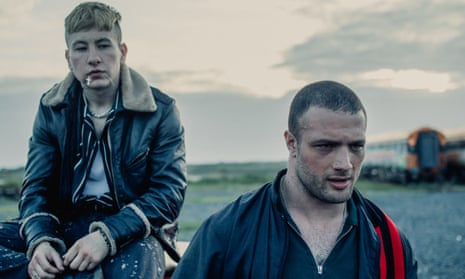The musician and actor Cosmo Jarvis looks eerily like a young Marlon Brando in this brutal gothic-realist drama set in the west of Ireland, directed by feature first-timer Nick Rowland. Adapted by screenwriter Joe Murtagh from a short story by Colin Barrett in his prize-winning collection Young Skins, it’s a lowlife crime drama with a streak of tragedy, despair and irreverent black humour. It’s powerfully and pugnaciously acted, and horses are brought in – as animals often are in social-realist movies – as symbols of redemptive nobility. But I felt that in narrative terms it turned into a cul-de-sac of macho violence.
Jarvis plays Douglas, a big and ferocious ex-boxer now employed as an enforcer by a firm of drug dealers. This is the Devers family: Paudi (Ned Dennehy) and his notionally more respectable brother Hector (David Wilmot). A young cousin of the Devers is Dympna (Barry Keoghan) who has brought Douglas into this line of work and it is his semi-official job to mind Douglas, to handle him and to make sure he shows up for whatever grisly task the brothers have set. Right now, Douglas has to beat up an old man who has raped Hector’s teenage niece Charlotte (Hazel Doupe), and he dispenses this punishment with considerable professionalism in an all-but-unwatchable scene. But his bosses aren’t satisfied with the level of pain meted out.
Meanwhile, Douglas is experiencing a kind of self-awakening. He has a five-year-old son, Jack (Kiljan Moroney), by former partner Ursula (Niamh Algar); the boy has autism, and Ursula has to pester Douglas for the money to send their son to a special school. As his boy gets older, it dimly dawns on Douglas that he, too, has a condition himself: an inability to control his surges of rage and anxiety. Ursula knows that Jack is helped by sessions of horse-riding and suspects the same might be true for Douglas – which results in a tender and engaging scene. Douglas in his muddled way is trying to be a good dad, though is unsure how this could be achieved.
But really, the language of this movie is fear and violence, peppered with some black-comic dialogue riffs between Dympna and Douglas. Perhaps the ending of the film is a little predicable, but a talented and well-directed cast keep this movie motoring along, and Jarvis is a fierce screen presence.

Comments (…)
Sign in or create your Guardian account to join the discussion